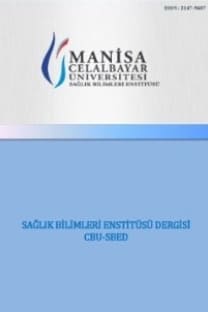Primipar Annelere Verilen Emzirme Danışmanlığının Emzirme Süresine, Doğum Sonu Depresyona ve Yaşam Kalitesine Etkisi
Emzirme Danışmanlığı, Emzirme süresi, Postpartum Depresyon, Yaşam Kalitesi
The Effect of Breastfeeding Counseling to Primiparaous Mother on Duration of Breastfeeding, Postpartum Depression and Quality of Life
___
- UNICEF, From the first hour of life (Making the case for improved infant and young child feeding everywhere.), New York, NY: Unicef, 2016.
- Turkey Demographıc and Health Survey (TDHS), Hacettepe University Institute of Population Studies, T.C. Ministry of Development and TUBITAK. 2013. Ankara, Turkey. (in Turkish)
- Choudhary, A, Bankwar, V, Choudhary, A, Knowledge regarding breastfeeding and factors associated with its practice among postnatal mothers in central India, International Journal of Medical Science and Public Health, 2015, 4(7), 973-976.
- Emiroğlu, H.H, Anne sütünün özellikleri ve anne sütü ile beslenme, Turkiye Klinikleri Journal of Pediatrical Sciences, 2017, 13(1), 15-21.
- Irmak, N, The importance of breastmilk and the factors that effect exclusive breastfeeding, The Journal of Turkish Family Physician, 2016, 7(2), 27-31.
- Borra, C, Iacovou, M, Sevilla, A, New evidence on breastfeeding and postpartum depression: the importance of understanding women's intentions, Maternal and Child Health Journal, 2015, 19(4), 897-907.
- Dias, C.C, Figueiredo, B, Breastfeeding and depression: a systematic review of the literature, Journal of Affective Disorders, 2015, 171, 142-154.
- Gregory, E.F, Butz, A.M, Ghazarian, S.R, et al, Are unmet breastfeeding expectations associated with maternal depressive symptoms? Academic Pediatrics, 2015, 15(3), 319-25.
- Gözükara, F, Key factor in the success of breastfeeding: provision of father support and nurse's roles, Harran University Faculty of Medicine Journal, 2014, 11(3), 289-96.
- Figueiredo, B, Canário, C, Field, T, Breastfeeding is negatively affected by prenatal depression and reduces postpartum depression, Psychological Medicine, 2014, 44(5), 927-936.
- Kartal, B, Kaplan, B, Buldu, A, et al., Breastfeeding characteristics and breast problems of postpartum women, Izmir University Medical Journal, 2015, (1), 1-10.
- Mortazavi, F, Mousavi, S.A, Chaman, R, Does maternal quality of life influence breastfeeding difficulties? Iranian Journal of Pediatrics, 2014, 24(4), 452-460.
- Nishioka, E, Haruna, M, Ota, E, et al., A prospective study of the relationship between breastfeeding and postpartum depressive symptoms appearing at 1-5 months after delivery, J Affect Disord, 2011, 133(3), 553-9.
- Cox, J.L, Holden, J.M, Sagovsky, R, Detection of postnatal depression, Development of the 10-item edinburgh postnatal depression scale, The British Journal of Psychiatry, 1987, 150(6), 782-786.
- Engindeniz, A, Küley, L, Kültür, S, Edinburgh postpartum depression Scale Turkish version validity and reliability study. Spring Symposiums Book, Turkish Psychiatric Association Publications, Ankara, 1997, 51-52.
- Hill, P, Aldag, J, Heke,, B, et al, Development of a questionnaire to measure maternal postpartum quality of life, Journal of Nursing Measurement, 2007, 14, 205-220.
- Altuntuğ K, Ege, E, Validity and Reliability of the Turkish version of the postpartum quality of ife scale, Journal of Anatolia Nursing and Health Sciences, 2012, 5(3), 214-222.
- WHO, World Health Statistics 2015. http://apps.who.int/iris/bitstream/10665/170250/1/9789240694439_eng.pdf?ua=1&ua=1. (accessed 14.08.2017)
- Mohamad Yusuff, A.S, Tang, L, Binns, C.W, et al, Breastfeeding and postnatal depression: a prospective cohort study in Sabah, Malaysia, Journal of Human Lactation, 2016, 32(2), 277-281.
- Woolhouse, H, James J, Gartland, D, et al, Maternal depressive symptoms at three months postpartum and breastfeeding rates at six months postpartum: Implications for primary care in a prospective cohort study of primiparous women in Australia, Women Birth, 2016, 29(4), 381-387.
- Wouk, K, Stuebe, A.M, Meltzer Brody, S, Postpartum mental health and breastfeeding practices: an analysis using the 2010-2011 pregnancy risk assessment monitoring system, Maternal and Child Health Journal, 2017, 21(3), 636-647.
- Ahn, S, Corwin, E.J, The association between breastfeeding, the stress response, inflammation, and postpartum depression during the postpartum period: Prospective cohort study, International Journal of Nursing Studies, 2015, 52(10), 1582-1590.
- Annagür, A, Annagür, B.B, Şahin, A. et al, Is maternal depressive symptomatology effective on success of exclusive breastfeeding during postpartum 6 weeks? Breastfeeding Medicine, 2013, 8(1), 53-57.
- Özkan, H, Üst, Z.D, Gündoğdu, G, et al, The relationship between breast feeding and depression in the early postpartum period, The Medical Bulletin of Sisli Hospital, 2014, 48(2), 25-32.
- Şahin, H, Yılmaz, M, Aykut, M, et al, Breastfeeding problems and risk factors in mothers who applied to two community health centers in Kayseri, Turkish Pediatrics Archive, 2013, 48(2), 145-151.
- Sadat, Z, Abedzadeh Kalahroudi, M, Kafaei Atrian, M, et al, The Impact of postpartum depression on quality of life in women after child's birth, Iranian Red Crescent Medical Journal, 2014, 16(2), e14995.
- Bahadoran, P, Alijanpoor, M, Usefy A, Relationship between infants’ feeding pattern and mothers’ physical and psychological health among the mothers covered by the health centers of Isfahan in 2013, Iranian Journal of Nursing and Midwifery Research, 2015, 20(2), 216.
- Mortazavi, F, Mousavi, S.A, Chaman, R, et al, Maternal quality of life during the transition to motherhood, Iranian Red Crescent Medical Journal, 2014, 16(5), e8443.
- Jain, A, Tyagi, P, Kaur, P, et al, Association of birth of girls with postnatal depression and exclusive breastfeeding: an observational study, BMJ Open, 2014, 4 (6), 1-6.
- Liu, S, Yan, Y, Gao, X, et al, Risk factors for postpartum depression among Chinese women: path model analysis, BMC Pregnancy Childbirth, 2017, 17(1), 133-140.
- ISSN: 2147-9607
- Yayın Aralığı: 4
- Başlangıç: 2014
- Yayıncı: Manisa Celal Bayar Üniversitesi Sağlık Bilimleri Enstitüsü
Dursun TOPAL, İsmet ZENGİN, Berat UĞUZ, Selvi ÖZTAŞ, Selma KENAR TİRYAKİOĞLU
Fazilet UĞUR DUMAN, Gizem AKKAŞ AKGÜN, Hasan AYDEDE, Semin AYHAN, Peyker TEMİZ
Buğra YILDIRIM, Hakan BAYDUR, Ercüment ERBAY
Presepsin: Sepsis tespiti için umut verici yeni bir biyobelirteç
Meltem MALKOÇ, Birgül VANİZOR KURAL
Tip 2 Diyabetli Bireylerde Seyahat Zevk mi? Yoksa Eziyet mi? Kalitatif Bir Yaklaşım
Sibel ŞENTÜRK, Nurten TERKEŞ, Derya AKÇA
Cemil DEMİR, Songül ÇETİK YILDIZ
Hepatosellüler Karsinomda Klinik ve Prognostik Özelliklerin Değerlendirilmesi: Tek Merkez Deneyimi
Atike Pınar ERDOĞAN, Ferhat EKİNCİ, Ahmet ÖZVEREN, Ahmet ÖZVEREN, Cumali ÇELİK, Seval AKAY, Gamze GÖKSEL
